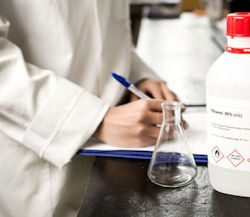Worksite Analysis
To be effective in recognizing and evaluating on-the-job hazards and recommending controls, industrial hygienists must be familiar with the characteristics of all hazards.
Major job risks can include air contaminants and chemical, biological, physical, and ergonomic hazards.
A worksite analysis is an essential first step that helps an industrial hygienist determine what jobs and work stations are the sources of these potential and existing hazards.
During the worksite analysis, the industrial hygienist measures and identifies exposures, problem tasks, and risks. The most effective worksite analyses include all jobs, operations, and work activities.
The industrial hygienist inspects, researches, or analyzes how the particular chemicals or physical hazards at that worksite affect worker health. If a situation hazardous to health is discovered, the industrial hygienist recommends the appropriate corrective actions.
Knowledge Check Choose the best answer for the question.
1-3. What is the first step industrial hygienists take to determine what jobs and workstations are sources of hazards?
You forgot to answer the question!

